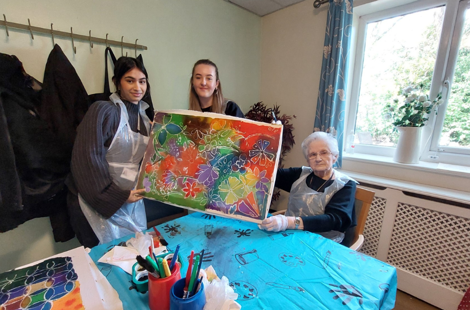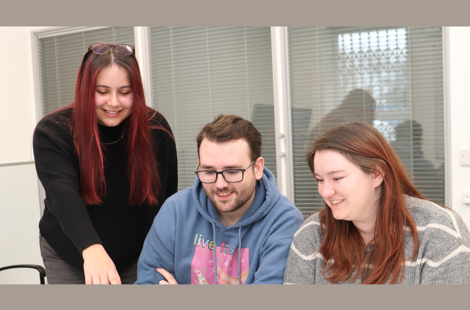
Bury College Art students bring colour to Rose Court Care Home
Our second-year Textiles and Fine Art pathway students recently visited Rose Court Care Home to run a series of arts and crafts workshops.
“Thank you for your interest in the Working with Children and Families Department! Whatever the status of your application, I hope the following information will help prepare you for future studies in Working with Children and Families, maybe even help you decide that Bury College University Centre is the place for you.”
Sarah Morris - Programme Lead
Sarah writes, develops, delivers, and supports and mentors on FdA Teaching Assistants, BA (Hons) Supporting Teaching and Learning, and BA (Hons) Working with Children and Families.
Sarah’s qualifications include;
For those still thinking about their options, our current students have provided some reasons why they chose to pursue a university education:
This degree, which is awarded by the University of Cumbria and taught at Bury College University Centre, is aimed at people wanting to work with children, young people and families. It covers a wide range of issues affecting children and families in today’s society. Each of the modules provides a secure grounding in issues for all professionals working in multi-agency contexts with children and their carers.
The course is validated by the University of Cumbria, and we have been running the course for around 7 years now. The course covers a wide scope of issues, and takes you through the lifespan of working with children and families. Those with a childcare background who want to branch out will benefit from this breadth of study. Distinguishing features of the course include the emphasis on interdisciplinary working, employability, internationalisation, research skills and social justice/policy.
Modules you may study include:
Level 4 – first year
Level 5 – second year
Level 6 – third year
As part of the Personal/Professional Development modules you will undertake placements in a variety of settings, this could be paid or voluntary work. This varies by year but is between 50 and 70 hours.
Across the course, the modules will present different ways of working, and allow you to gain a variety of skills. There are three modules per semester, and two semesters in an academic year, so six modules total.
Each module will require you to complete a summative assessment, which can vary in its challenges. Some assessments might be a straight-forward 3000-word essay, but most modules have a mixed model. For example, play and creative developments is about working with others, and there is an element of groupwork to produce a practical resource that will be aimed at children, young people or families, as well as a small written portfolio.
Other assessment methods might include:
We are looking to ensure that by the time our students finish their course, they are:
Past students on this course have gone into a variety of roles and future destinations, including:
Hear from past and current students!
Ricci said, “Tutors are really supportive… and the course has shown me so many potential careers that I want to explore.”
Jhelita said, “I am looking forward to see what the future holds; I am so glad I chose Bury College University Centre.”
Ezekiel said, “The degree is opening up so many future career pathways for me to study, e.g. social worker, teaching, and working in the social sector.”
Our friendly staff are happy to answer any questions you may have about your course or the University Centre. We can also put you in contact with your course tutor for a chat. Please email victoria.rowcroft@burycollege.ac.uk with any queries.


Our second-year Textiles and Fine Art pathway students recently visited Rose Court Care Home to run a series of arts and crafts workshops.
Bury College students have been participating in the Greater Manchester Colleges Skills Competition and have been rewarded for their hard work by finishing in the top two in several areas.

Are you a small business in Greater Manchester, or the surrounding area, looking to take on apprentices?

Since leaving us, William Hardman has travelled the world working as a self-employed video technician and camera operator in the music and live events industry.
In addition to excelling in her studies, a Bury College Sports student has been busy representing England in Athletics.

Students and staff from our Hair, Beauty, Barbering and Media Make-up courses have moved into our brand-new Hair and Beauty Centre.